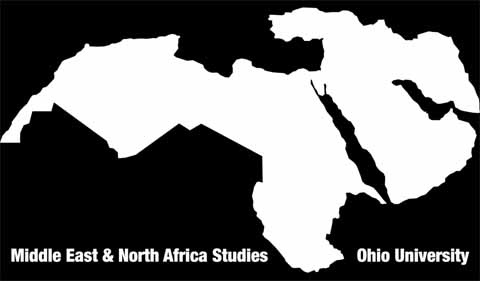
Undergraduate students at Ohio University are now able to earn a Middle East and North Africa Studies Certificate.
Knowledge of the Middle East and North Africa region has become increasingly central to a range of professional careers, including those in the educational, media, development, financial, policy, and defense sectors.
This certificate program provides students with much-needed knowledge on the geography, history, and contemporary politics of the region. After graduation, students will be better able to both compete in the job market and succeed in their jobs. In addition, all of these opportunities serve to also better prepare students for potential graduate study in a discipline or program in which the Middle East and North Africa will feature centrally in the students’ course of study.
This program addresses a range of students’ academic and professional interests while drawing on a diversity of faculty-offered courses.
Students, faculty, and advisors interested in learning more about the Middle East and North Africa Studies Certificate should contact the coordinator of the program, Dr. Ziad Abu-Rish at abuz@ohio.edu.
About the Middle East and North Africa Studies Certificate
The Middle East and North Africa Studies Certificate is designed to provide an interdisciplinary understanding of the history and contemporary dynamics of the Middle East and North Africa region. The curriculum draws on the expertise of faculty from across the social sciences and humanities whose training, research, and teaching center on the Middle East and North Africa region. This is all the more important to address given the immense importance of the region to a variety of careers, including education, journalism, international affairs, public policy, economic development, and security.
Requirements
The Middle East and North Africa Studies Certificate program requires a minimum 2.0 GPA and 15 credit hours (5 courses), divided between core, interdisciplinary, and elective requirements. Students have a broad range of courses to choose from, and can pursue them in the order that best fits their schedules. [Please note that the below requirements reflected the most up-to-date information on the certificate requirements. See contact information below for any questions or concerns.]
Core Requirement
Students are required to take the following one (1) course:
- HIST 3371 – Middle East History 1500 to the Present
Interdisciplinary Requirements
Students are required to complete two (2) courses from two different departments from the following courses:
- ANTH 3820 – Cultures of the Mediterranean
- ARAB 1120 – Elementary Arabic II
- CLWR 3330 – Introduction to Islam
- CLWR 4330 – Political Islam
- CLWR 4340 – Sufism-Mysticism and Asceticism in Islam
- MDIA 4170 – Media and the Muslim World
- POLS 4420 – Middle East Politics
Elective Requirements
Students are required to complete two (2) of the following courses:
- ANTH 3820 – Cultures of the Mediterranean
- ARAB 1120 – Elementary Arabic II
- CLAR 2130 – Near Eastern and Egyptian Archaeology
- CLAS 2510 – Ancient Jerusalem: From Solomon to Suleiman
- CLAS 2530 – Alexander the Great and the Hellenistic World
- CLWR 3330 – Introduction to Islam
- CLWR 4330 – Political Islam Credit
- CLWR 4340 – Sufism-Mysticism and Asceticism in Islam
- HIST 2270 – The Middle East and the World
- HIST 3293 – World of Late Antiquity
- HIST 3320 – Women, Gender, and Sexuality in Middle East History
- HIST 3330 – Oil, the Persian Gulf, and World Power
- HIST 3370 – Middle East History 600 to 1500
- HIST 3372 – Protest, Rebellion, and Revolution in the Modern Middle East
- HIST 3532 – History of the Crusades
- HIST 3562 – Muslims, Christians, & Jews in History of Medieval Spain
- HIST 4905 – Colloquium in Middle Eastern History
- MDIA 4170 – Media and the Muslim World
- POLS 4420 – Middle East Politics
- POLS 4902 – Special Topics in Law and Politics
Contact
Students, faculty, and advisors interested in learning more about the Middle East and North Africa Cetificate should contact the coordinator of the program, Dr. Ziad Abu-Rish at abuz@ohio.edu.


















Comments